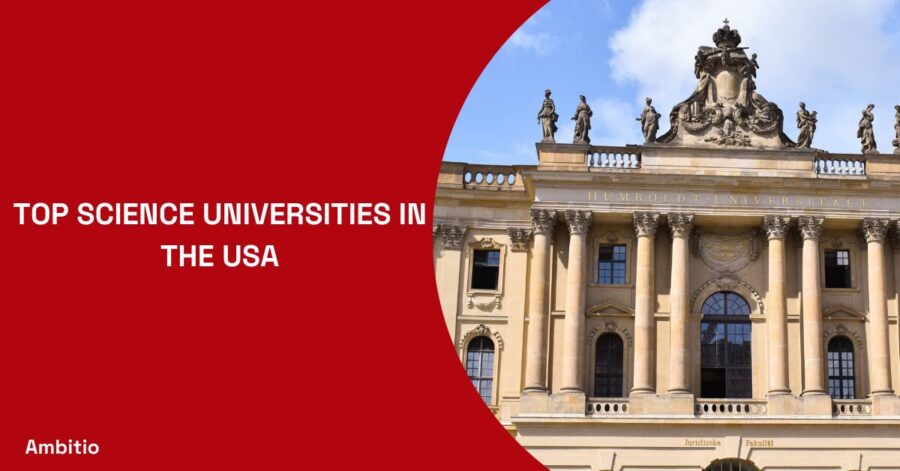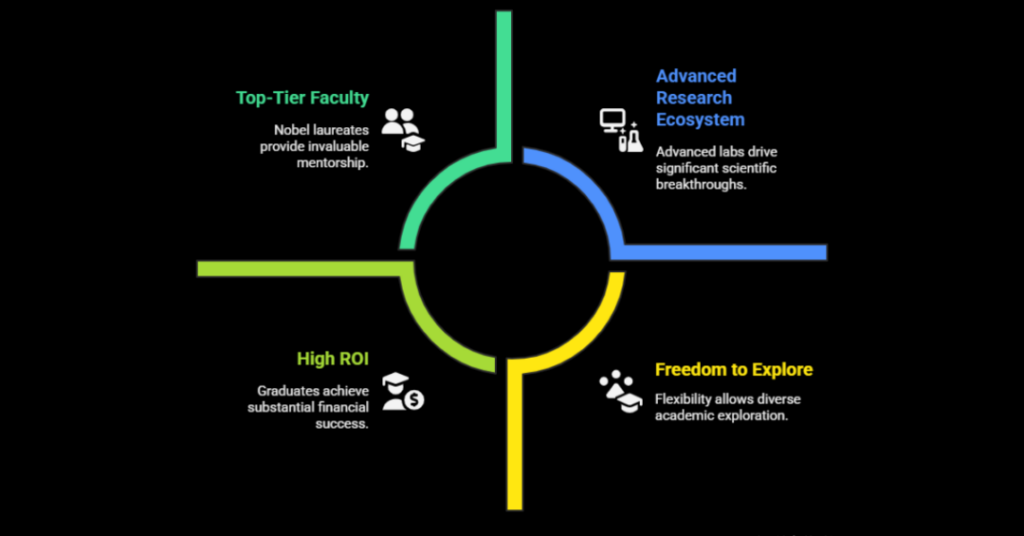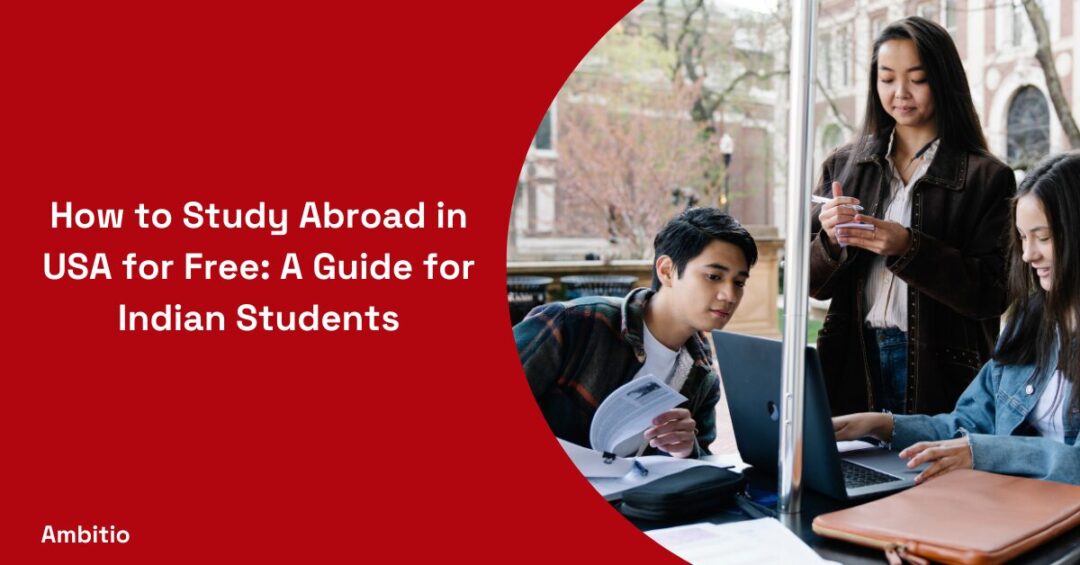29 July 2025
6 minutes read
10 Top Ranking Science Universities In The US For Indian Students In 2025

Key Takeaways
- Top science universities in the US lead global rankings and offer cutting-edge research opportunities for Indian students in 2025
- Studying in the US gives you unmatched flexibility to explore disciplines like biology, earth sciences, and physics without being locked into one path
- Masters from US universities like MIT, Stanford, and Caltech offer high ROI with salaries crossing $100,000 annually
In 2025, a whopping 6 out of the top 10 global science universities are based in the US — and no, getting into them isn’t a cakewalk, especially if you’re an Indian student navigating college applications, financial stress, and visa anxiety all at once. Rankings don’t lie — Harvard University, Stanford University, MIT, and Caltech are still ruling the charts in disciplines like environmental sciences, biotechnology, and advanced research. But here’s the kicker — they’re not just looking for toppers. They’re scouting for thinkers.
No one tells you how messed up and confusing this journey can be. Between agents promising false hopes, thousands of websites giving recycled info, and endless YouTube videos that say everything but help you decide — it’s overwhelming. You don’t need more noise. You need the right schools, clear facts, and a brutally honest view of your odds. And yes, that’s what this blog delivers — not just rankings, but real insights on Stanford, Yale, Berkeley, and others that actually welcome Indian talent — if you know how to stand out. Let’s get you there.
Why Study Science In The US?
C’mon, you don’t want to end up in a lab that still runs on Windows XP and considers “projector not working” as a reason to cancel class. The best colleges in the US aren’t just on top because of hype.

They’re leading the world university rankings by subject because they invest in innovation, not just brochures. Want access to telescopes that map exoplanets or labs that decode genomes before your coffee brews? Then yes, studying science at top universities in the US isn’t optional — it’s non-negotiable.
1. Unmatched Research Ecosystem (That Actually Works)
The US university system is home to the most advanced labs on the planet — from marine sciences at Scripps to forestry and earth sciences at UC Berkeley. These aren’t just lecture halls; they’re billion-dollar playgrounds for science geeks. When QS World University Rankings and Times Higher Education evaluate universities across research output, the US-based institutions dominate. Because unlike many other countries, America puts real money where the microscope is.
2. Top-Tier Faculty With Nobel Credentials
At the best science schools, you’re not learning from YouTubers — you’re being mentored by Nobel Prize winners and field-changing researchers. Princeton University, Rice University, and others in the top 50 of the world university rankings are known not just for prestige, but for real, on-the-ground mentorship in life science, biochemistry, and biological sciences. You want insight into cutting-edge physical sciences or breakthrough research in veterinary science? These professors wrote the papers you’re citing.
3. Freedom to Explore — and Switch Gears
Only in the US universities ranked in the top 100 can a student begin in social sciences, pivot into engineering schools, dabble in natural sciences, and finally major in universities for physics — all without being boxed into a one-track academic death sentence. The college admissions process in the US values curiosity over conformity. That means more research opportunities, better student life, and actual space to discover what lights you up — before it’s too late.
4. ROI That Pays for Itself (Sometimes in Millions)
Yes, the application process is intense. And yes, tuition isn’t cheap. But the high earning potential after graduating from the top 10 universities or top colleges in the US — especially the Ivy League and elite public universities — often makes it worth every late-night essay. According to US News and 2025 best return on investment studies, grads from best universities like the University of California system, Columbia, and Ivy schools regularly out-earn their international counterparts. That’s not hype. That’s rankings methodology backed by paychecks.
10 Top Universities For Masters In Science In The USA 2025
Over 50% of the top 100 institutions in the QS World University Rankings for natural sciences are in the US. And these aren’t just well-ranked for the sake of it — they dominate world university rankings by subject because they invest in cutting-edge research, elite faculty, and the kind of infrastructure that turns students into global scientists, not just degree holders.
And let’s not beat around the bush — you want to know two things: how much will it cost, and what will you earn back? So here’s a brutally honest breakdown of the best universities for a Masters in Science in the USA 2025, based on actual data and outcomes.
| University Name | Average Tuition Fees (Per Year) | Average Salary After MS |
|---|---|---|
| Massachusetts Institute of Technology (MIT) | $57,590 | $108,000+ |
| Stanford University | $59,160 | $115,000+ |
| Harvard University | $54,032 | $105,000+ |
| California Institute of Technology (Caltech) | $58,680 | $112,000+ |
| Princeton University | $53,890 | $102,000+ |
| University of California, Berkeley | $49,349 (non-resident) | $98,000+ |
| Columbia University | $65,232 | $100,000+ |
| Yale University | $46,900 | $95,000+ |
| University of Pennsylvania | $46,200 | $101,000+ |
| Johns Hopkins University | $58,720 | $97,000+ |
5 Tips To Increase Your Chances Of Admission In Top Colleges
top schools in the US isn’t about having a 4.0 GPA and a certificate for “Best Smile in 12th Grade.” If that worked, half of LinkedIn would be Ivy League grads by now. The reality? Schools like Cornell University aren’t just scanning your resume for academic perfection — they’re decoding your story, your grit, and whether you bring something real to their campus that isn’t already printed on 10,000 other applications. And no — your “passion for math since childhood” essay won’t cut it.
Here’s how to actually stand out and not sound like another Ctrl+C/Ctrl+V applicant:
1. Show You Know the School — Like, Really Know It
Every top school has a unique culture. Cornell University isn’t just an Ivy; it’s a hybrid of public-private power, research madness, and interdisciplinary freedom. Referencing a random professor or quoting their website doesn’t cut it. Dive deep. Mention a niche lab, a course not available elsewhere, or a student-run project you actually want to join. It shows you’re not blindly applying — you’ve done the homework.
2. Drop the Trophy List — Tell a Damn Good Story Instead
Admissions officers read thousands of essays titled “How Robotics Changed My Life.” What they remember are real, raw stories. Maybe it’s the summer you taught yourself Python on a 3G phone. Or how being rejected from your school’s science team taught you more than winning ever could. Top schools like Cornell don’t want a perfect profile — they want a standout narrative.
3. Strategically Use Your Optional Essay (It’s a Trap — If You Ignore It)
That “optional” section? It’s not optional if you want a real shot. Use it to explain gaps, low grades, or unexpected shifts — but own them. Cornell and other top schools appreciate context, resilience, and reflection more than robotic perfection. You’re not a spreadsheet. Don’t apply like one.
4. Get Recommenders Who Will Fight For You (Not Just Describe You)
Your chemistry teacher saying “He was punctual” won’t open Ivy gates. Choose someone who can tell a story about your growth — how you tackled failure, showed leadership, or sparked change in class culture. Great recs come from people who believe in you, not just those with fancy titles.
5. Stop Copy-Pasting Résumé Brag Sheets — Customize Every Application
It’s painfully obvious when you’ve sent the same application to 15 top schools. Customization is everything. Align your goals with what that university uniquely offers. When schools like Cornell University feel you fit into their ecosystem — not just want a name-brand degree — that’s when your file moves from the maybe pile to the interview list.
Conclusion
USA is where science moves fast, research has real-world impact, and opportunity meets preparation. But don’t get lost in the noise of rankings and glossy websites. Focus on where you actually fit — the labs, the mentors, the mindset.
Because getting into a top school isn’t just about numbers. It’s about alignment — between what they offer, and what you’re genuinely chasing. If you get that part right, the rest tends to follow.
To get into a top U.S. university isn’t just about grades—it’s about strategy. Ambitio’s AI-powered platform and expert consultants help you tackle applications, study gaps, and visa approvals with confidence. No confusion, no wasted time—just a clear path to your dream school. So if you want to study in USA, Ambitio is the answer.
FAQs
Q1. What makes a university rank as a top science institution?
Rankings are based on factors such as research output, faculty qualifications, funding, and innovation in science education.
Q2. How important are standardized test scores in the application process?
While important, they are one of several factors considered, including GPA, research experience, and personal statements.
Q3. Can I apply for scholarships if I’m an international student?
Yes, many universities offer scholarships for international students, though eligibility and availability may vary.
Q4. What opportunities are available for undergraduate research?
Most top universities offer numerous opportunities for undergraduates to engage in research, often including summer programs, internships, and independent projects.
Q5. How can I make my application stand out?
Highlight unique research experiences, and personal achievements, and articulate a clear vision of your academic and career goals.

You can study at top universities worldwide!
Get expert tips and tricks to get into top universities with a free expert session.
Book Your Free 30-Minute Session Now! Book a call now




























